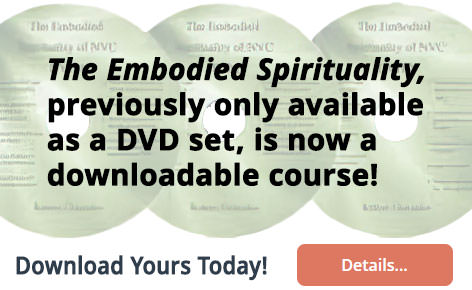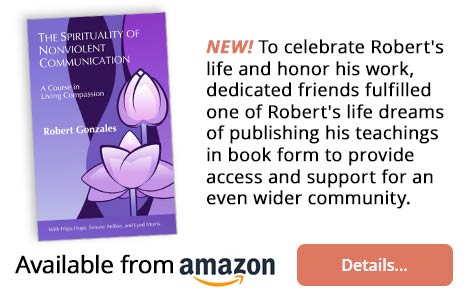

Welcome to the Robert Gonzales Training Legacy. Here you can learn more about Robert and the powerful teachings he dedicated his life to. NVC Academy is proud to house and share with you the complete body of his life's work. We invite you to explore, learn, and help keep his legacy alive!
Robert's passion was in the spirituality of the Nonviolent Communication (NVC) process. He saw NVC both as a process that helps people connect more authentically with themselves and others, and as a spiritual practice and way of living. The worldwide NVC community mourned when Robert died in 2021. He left behind a legacy of work that emerged from a lifetime of inquiry into the intersection between spirituality and human communication. More about Robert.
Practice Exercise
4 - 6 minutes
Anger, guilt, shame, and shutdown are often based on reactivity and “should” thinking. They narrow and distort perceptions, which can bring more suffering. So instead, feel them without resistance, nor acting on them. Bring clarity by naming your observables and thoughts, plus your underlying vulnerable feelings, needs and self-responsibility. Then mourn what needs were, or are, unmet. Only then choose what actions to meet needs.
Details...Trainer Tip
1 - 2 minutes
Trainer Tip: Whether we listen to our own or the other person’s needs first, connecting to needs can help us release judgments of others, see their humanness, help us to begin to hear them and ultimately connect to them. Be aware today of times when you are judging someone. Then be aware of your own needs to improve your connection to them.
Details...Video
9 minutes
How do you build new learning paths and change old practices? Listen as David presents the elements of somatic practice — including those that build new learning paths — and discover where that learning “sweet spot” is!
Details...Article
6-9 minutes
Our everyday personal experiences of diminishment, and the destruction of our planet has a through-line. Societal traumas lead to us shutting down to avoid pain, and this limits us. The avoidance shifts our brains so we don’t see other beings, species and our planet as wondrous, precious and irreplaceable. Thus, we meet others with diminishment, oblivion, or abuse; trauma keeps passing on. This leads to being blind and mute, and to othering based on social location, and to destruction of our planet.
Details...Trainer Tip
1-2 minutes
The highest leverage point for effective meetings is preparing with self inquiry. Before saying something, we can ask ourselves about who this is serving, what needs it serves to say it, if there is a request we want to make, how to make the request actionable, and more. If more people at meetings do this, it can reduce the overall number of tangents we experience at meetings.
Details...Trainer Tip
1 - 2 minutes
Trainer Tip: Thinking someone is bad, wrong, or evil can make it more difficult to connect with them. If we focus on this kind of thinking, we stay in the problem or conflict. The minute we step out of judgement and listen for the needs underlying their actions, we begin working for the solution. Put your focus in the direction of the result you want. Read on for an example.
Details...Practice Exercise
3 - 5 minutes
Even those who practice NVC can repeat old patterns of thinking, believing, feeling, and behaving. If they do, but still use ‘NVC language’ others may think the issue is NVC rather than the person’s capacity. This week, notice even a small instance where someone is against something you suggest. To build trust and connection, experiment with offering empathy or asking them to share what they think, feel, or need.
Details...Trainer Tip
1 - 2 minutes
Trainer Tip: Whether there is the potential of physical or emotional violence, listening deeply to the underlying needs of the people in conflict can be swift, direct, and healing. Look for opportunities to defuse conflicts by reflecting the feelings and needs of the other person.
Details...Trainer Tip
1 - 2 minutes
Some questions will take you deeper and deeper to universal human needs when you toggle between them. Questions like “What do I need?”, “If I had that, then what would I have?”, and “If I had that, what would that give me?”
Details...Learning Tool
1-2 minutes
This one page colour handout illustrates the focus options or intention options for connection: empathy (verbal and non-verbal), self expression, and self connection (opening our heart to self and/or others). It also offers some suggestions for how to say these things to self and others.
Details...

